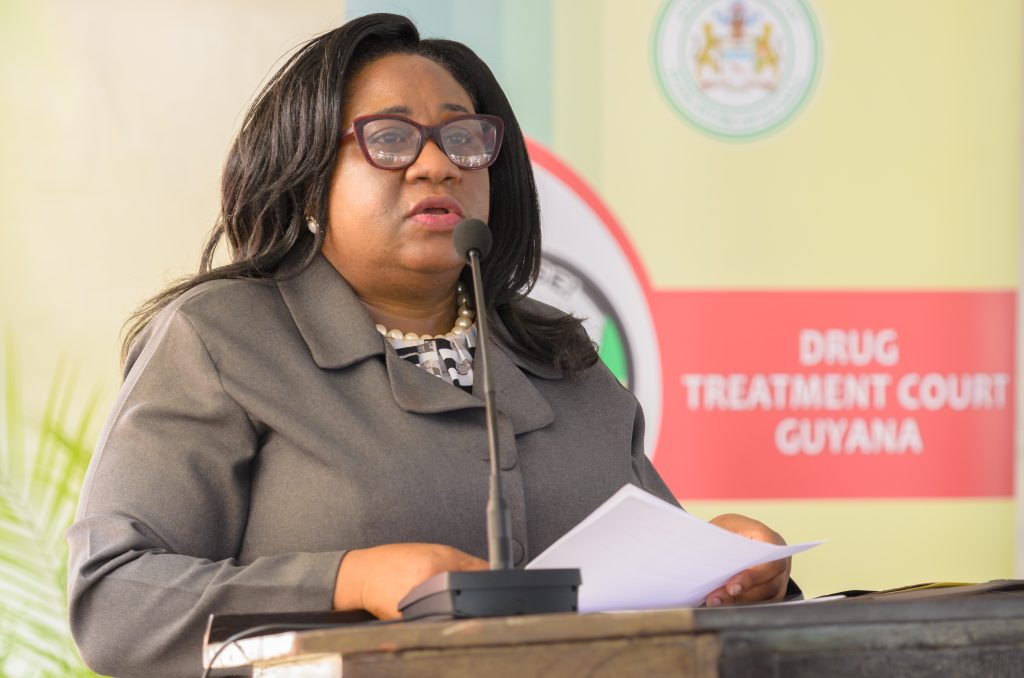
‘Prevention, not incarceration’ – Guyana opens first juvenile drug treatment court
By Isanella Patoir
Guyana on Tuesday launched its first Juvenile Drug Treatment Court which is specifically designed to intervene and prevent the incarceration of youths under the age of 18 who commit minor offences and who are found to be substance abusers.
The court will operate within the framework of several agencies, including the Childcare and Protection Agency, the Ministries of Education and Health, the Police Force and the Salvation Army among others.
The overall mission of the court is to reduce crime and substance abuse by youths in Guyana. Oftentimes when persons become addicted to drugs, whether they are adults or young people, it leads to them committing minor offences to support their addiction.

And based on practices regionally and internationally, it is better to provide long-term treatment to these offenders rather than incarcerate them. It was also noted that there has been an alarming trend of drug use in the school system.
The idea to establish a Juvenile Drug Treatment Court was birthed in August 2020 by Chancellor of the Judiciary (ag) Justice Yonette Cummings-Edwards.
A task force was then set up and was headed by Chief Magistrate Ann McClennan to plan and launch the facility which officially opened on Tuesday at 12 magistrate courts across Guyana.
Prior to this, training was conducted locally and internationally for members who will operate at the facility. The Chief Magistrate and other magistrates underwent training in Jamaica and the United States before they designed the policy and manual to govern the specialised court.
Chief Magistrate Ann McLennan, in her remarks at the Georgetown Magistrates’ Court, explained what matters will be heard at this special court.

“These will be youths who are charged with a minor non-violent criminal offence; for example, assaults under Section 21 of the Summary Jurisdiction Offences Act, but these assaults will not be domestic violence-related or drug-related offences. Also under the Narcotics Act under section 4 and in this regard, the quantity will be less than 14 grammes,” McLennan said.
To enter the drug treatment programme, the juvenile offender must be charged and there must be a guilty plea; the offender must also submit an assessment along with a drug test taken under controlled conditions within 24 hours of applying to the court.
The sentence for the offence will then be deferred pending the successful completion of the juvenile drug treatment programme.
The treatment plan has four stages which will last for about 10 months and will be supervised by a competent team.
The team comprises a state counsel, probation and social officers, drug abuse treatment providers, the case manager, representatives from the Ministries of Education and Health and family members.

The Chancellor (ag), in her remarks, said for the past three years there have been a total of 625 cases of juveniles in conflict with the law. In 2019, 343 cases were recorded; 166 in 2020 and 126 cases in 2021.
“We have not bothered to look at the statistics this year. This, in itself, will provide a guide for where we are and what we need to do.
“I look forward as a community to deal with this issue of drug abuse or drug use in our young people,” the Chancellor stated while explaining that the legal systems have to work collectively to address issues that affect young people.
The court will also provide early intervention services. Statistics around the world have shown positive outcomes from having such courts.
“If we have locking up as the only [alternative] or incarceration as the only alternative available, it will not deal with the issue affecting our children,” the Chancellor posited.

Meanwhile, the Chancellor was keen to note that there will be no breach of human rights in the court.
The new court is being rolled out in collaboration with UNICEF and the agency’s representative to Guyana and Suriname Nicholas Pron commended the judiciary for creating a children-friendly solution in the justice system.
He noted that many countries neglect and overlook justice for children.
The court was established in Whim and New Amsterdam in Region Six; Wales, Leonora and Vreed-en-Hoop in Region Three; Suddie and Charity in Region Two; Vigilance, Sparendaam and Georgetown in Region Four and Linden in Region Ten.





